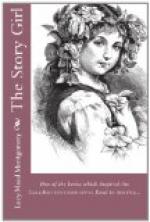We took a drink from the blue cup and then went to find our birthday trees. We were rather disappointed to find them quite large, sturdy ones. It seemed to us that they should still be in the sapling stage corresponding to our boyhood.
“Your apples are lovely to eat,” the Story Girl said to me, “but Felix’s are only good for pies. Those two big trees behind them are the twins’ trees—my mother and Uncle Felix, you know. The apples are so dead sweet that nobody but us children and the French boys can eat them. And that tall, slender tree over there, with the branches all growing straight up, is a seedling that came up of itself, and nobody can eat its apples, they are so sour and bitter. Even the pigs won’t eat them. Aunt Janet tried to make pies of them once, because she said she hated to see them going to waste. But she never tried again. She said it was better to waste apples alone than apples and sugar too. And then she tried giving them away to the French hired men, but they wouldn’t even carry them home.”
The Story Girl’s words fell on the morning air like pearls and diamonds. Even her prepositions and conjunctions had untold charm, hinting at mystery and laughter and magic bound up in everything she mentioned. Apple pies and sour seedlings and pigs became straightway invested with a glamour of romance.
“I like to hear you talk,” said Felix in his grave, stodgy way.
“Everybody does,” said the Story Girl coolly. “I’m glad you like the way I talk. But I want you to like me, too—as well as you like Felicity and Cecily. Not better. I wanted that once but I’ve got over it. I found out in Sunday School, the day the minister taught our class, that it was selfish. But I want you to like me as well.”
“Well, I will, for one,” said Felix emphatically. I think he was remembering that Felicity had called him fat.
Cecily now joined us. It appeared that it was Felicity’s morning to help prepare breakfast, therefore she could not come. We all went to Uncle Stephen’s Walk.
This was a double row of apple trees, running down the western side of the orchard. Uncle Stephen was the first born of Abraham and Elizabeth King. He had none of grandfather’s abiding love for woods and meadows and the kindly ways of the warm red earth. Grandmother King had been a Ward, and in Uncle Stephen the blood of the seafaring race claimed its own. To sea he must go, despite the pleadings and tears of a reluctant mother; and it was from the sea he came to set out his avenue in the orchard with trees brought from a foreign land.
Then he sailed away again—and the ship was never heard of more. The gray first came in grandmother’s brown hair in those months of waiting. The, for the first time, the orchard heard the sound of weeping and was consecrated by a sorrow.
“When the blossoms come out it’s wonderful to walk here,” said the Story Girl. “It’s like a dream of fairyland—as if you were walking in a king’s palace. The apples are delicious, and in winter it’s a splendid place for coasting.”




